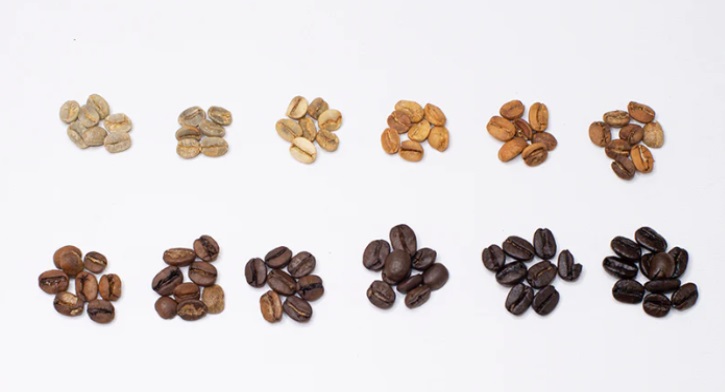
Coffee roasting is an art and a science, transforming green coffee beans into the aromatic browns we know and love through high heat and careful timing. The roast level, ranging from light to dark, significantly influences the flavor, but there’s a common myth about its impact on caffeine content. Many believe that the darker the roast, the higher the caffeine. However, the reality is not so black and white.
Does Dark Roast Coffee Have Less Caffeine?
The quick answer is that dark roast coffee does not necessarily have less caffeine than lighter roasts; the difference in caffeine content is actually quite minimal. The primary factor here isn’t the color of the roast, but how we measure the coffee. When using volume (like scooping), dark roast beans are lighter and larger due to the roasting process, so more beans are needed to make a full scoop, which might suggest more caffeine.
However, when measured by weight, the caffeine content across different roasts is nearly identical. This means the brewing method and your measurement technique play a crucial role in the caffeine you get from your morning cup, not just the roast itself.
Key Takeaways
- Bean Type Matters More Than Roast: Whether a bean is Arabica or Robusta affects its caffeine content more significantly than whether it’s lightly or darkly roasted. Arabica beans generally have less caffeine compared to the more robust Robusta beans.
- Measurement Techniques Influence Perceived Caffeine: How you measure your coffee—by mass or by volume—can slightly alter the perceived amount of caffeine. This is because dark roast beans, which are larger and less dense, might seem to have less caffeine when measured by volume.
- Roasting Time’s Impact on Beans: Longer roasting times make beans larger and less dense but do not significantly alter the chemical structure of caffeine within the beans.
Exploring the Science Behind Coffee Roasting and Caffeine Retention
Understanding how roasting influences the chemistry of coffee beans reveals a lot about caffeine levels. During the roasting process, beans undergo numerous chemical changes. They lose moisture and increase in size, which can make them appear to have less caffeine when measured by volume. This is because, as beans expand and become less dense, a scoop of dark roast coffee will have fewer beans than a scoop of light roast if measured by volume, not accounting for the actual mass of the beans.
The heat from roasting affects many compounds within the coffee bean, but caffeine is relatively stable in this process. Thus, the caffeine content remains fairly consistent regardless of the roast level. This stability means that any variation in caffeine content between light and dark roasts is more about how the beans are measured and less about any actual reduction in caffeine through the roasting process.
Comparative Analysis: Light Roast vs. Dark Roast Caffeine Content
When comparing the caffeine content in light and dark roast coffees, it’s crucial to clear up some common misconceptions with the help of recent studies and expert insights.
Firstly, the fundamental chemistry of caffeine remains largely unaffected by the roasting process. Caffeine, a stable compound, does not break down significantly during the roasting of coffee beans. This means that both light and dark roasts retain similar levels of caffeine when the beans are measured by weight.
However, the confusion often arises when coffee is measured by volume. Due to the roasting process, dark roast beans expand more and lose more moisture, making them lighter and larger. This results in fewer beans per scoop compared to lighter roasts, which are denser and smaller. So, if you scoop your coffee to measure it, you’ll end up with more actual beans (and thus potentially more caffeine) in a scoop of light roast than dark roast.
In practical terms, if you’re weighing your coffee for precise caffeine content, the differences between light and dark roasts are negligible. But if you’re using a scoop, the light roast may offer slightly more caffeine due to the density and size of the beans.
FAQs
Does the type of coffee bean affect caffeine content?
Yes, the type of coffee bean significantly impacts caffeine content. Arabica beans, which are widely used for their superior flavor and aroma, generally contain less caffeine than Robusta beans. Robusta beans are often used in espresso blends for their higher caffeine content and stronger, more robust flavor.
How does the brewing method impact caffeine extraction?
The brewing method can greatly affect how much caffeine ends up in your cup. Espresso machines, for example, use pressure to extract coffee quickly, resulting in a concentrated shot with a high level of caffeine per ounce. Methods like French press or drip brewing, which allow the water to interact with the coffee grounds longer, extract more caffeine overall but result in a less concentrated product.
Can the roasting temperature change the caffeine level?
While roasting temperature and duration impact the flavor and physical characteristics of coffee beans, they do not significantly alter the caffeine content. The stable nature of caffeine means that it remains relatively unchanged whether the beans are lightly roasted or charred to a dark finish.
Final Thoughts
When choosing between light and dark roast coffee, the caffeine content should not be a major concern as differences are minimal. The choice between dark and light roast should instead be based on flavor preference. Dark roasts offer deep, rich, and often chocolatey flavors, making them perfect for those who enjoy a robust cup of coffee. Light roasts, on the other hand, tend to retain more of the original flavors of the coffee bean, often resulting in a brighter, more acidic cup that highlights floral or fruity notes.









